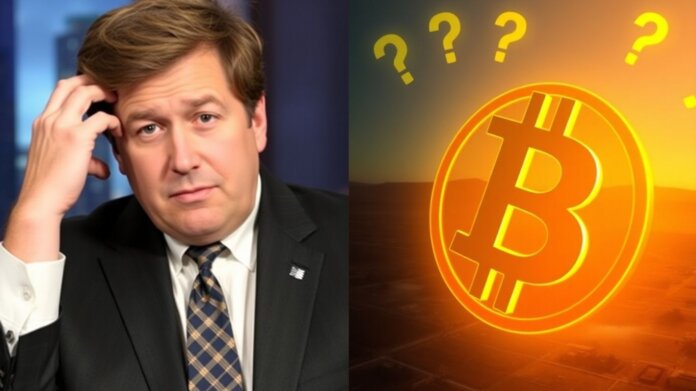Tucker Carlson recently shared some pretty wild ideas about Bitcoin, touching on everything from CIA conspiracies to fears of totalitarian control. He seems to grasp the appeal of financial freedom, but gets turned around on how Bitcoin actually works. This confusion shows how even smart commentators can misunderstand what Tucker Carlson Bitcoin discussions are really about: fixing broken money, not hiding from the system.
Key Takeaways
- Bitcoin’s Purpose: Bitcoin was created to fix the money system itself, not primarily for privacy.
- Fiat System Issues: The current dollar system is prone to inflation and benefits those close to the money spigot.
- Young People’s Struggles: Many young people are drawn to crypto due to a lack of financial opportunities in the traditional system.
- Roger Ver: Citing Roger Ver as a Bitcoin proponent shows a lack of understanding of Bitcoin’s history and the “block size wars.”
- CBDCs vs. Bitcoin: Tucker fears totalitarian control from digital currencies, but this applies to Central Bank Digital Currencies (CBDCs), not Bitcoin.
- Satoshi Nakamoto: The creator’s identity is irrelevant to Bitcoin’s function and security; the network runs on math, not trust.
- Gold vs. Bitcoin: While gold has a history, it failed due to trust issues, paving the way for Bitcoin as a superior monetary technology.
Tucker’s Take on Privacy and Autonomy
Tucker starts by saying he loves the idea of Bitcoin because he wants his financial transactions to be private. He doesn’t want his money tracked, and that’s a fair point. But here’s the first big mix-up: Bitcoin wasn’t really made to be a privacy tool. Its main job is to fix the money system itself. Think about it – the current system, the US dollar, is designed to lose value over time. The people who get the new money first, like those in government or on Wall Street, get ahead, while everyone else sees their savings shrink because of inflation. Bitcoin, on the other hand, has a fixed supply of 21 million coins. No printing more, no bailouts, no manipulation. That’s what real financial freedom looks like.
Young People and the Crypto Craze
He also talks about how young people are into crypto because they feel like the job market has failed them and they can’t get ahead financially. There’s some truth to this. The system has definitely let people down, but it’s the money that’s broken, not just the jobs. Many young folks are looking at crypto as a way to make it in this world, hoping for a quick win. It’s important to separate Bitcoin from the thousands of other cryptocurrencies out there. Bitcoin isn’t a get-rich-quick scheme; it’s more like an escape route from the endless cycle of inflation. When Tucker talks about people looking for financial opportunity, he’s often describing the speculative side of crypto, not the core promise of Bitcoin.
The Roger Ver Misstep
Then Tucker brings up Roger Ver as someone who “still believes in the promise of blockchain.” For those who know Bitcoin history, this is a red flag. Roger Ver was a big player in the “block size wars” back in 2017. He pushed to change Bitcoin’s rules to make it bigger, which would have made it harder for regular people to run the network and given more power to big miners. The community didn’t go for it, and Bitcoin stayed decentralized. Roger then promoted his own version, Bitcoin Cash, which hasn’t done well. Pointing to Roger Ver as a hero shows Tucker hasn’t done his homework on Bitcoin’s past.
Fear of Totalitarian Control: CBDCs vs. Bitcoin
Tucker expresses fear of digital currency, saying it could lead to “totalitarian control” if the government can freeze accounts or stop people from buying food. He’s right to be worried about that, but he’s talking about Central Bank Digital Currencies (CBDCs), not Bitcoin. CBDCs are what governments would use for surveillance and control. Bitcoin, however, is the opposite. No one can freeze your Bitcoin, reverse a transaction, or take your money. It’s permissionless. Ironically, Tucker Carlson Bitcoin fears describe the danger of government money, not decentralized money.
The Satoshi Mystery and Gold
One of the most talked-about parts is Tucker’s distrust of Bitcoin because “nobody can tell me who Satoshi is.” He even guesses it might be the CIA. This is a common conspiracy theory. If the CIA created Bitcoin, why would they make it open source and impossible to control? That goes against everything governments do with money. And honestly, Satoshi’s identity doesn’t matter. The network is decentralized and works based on math, not trust. We can check the code, verify the supply, and see how it operates. It’s like not needing to know who invented the internet to use it. It just works.
He also mentions being a gold buyer and feeling vindicated. Gold has been around for a long time, but it failed because it relied on trust in banks and governments. Governments eventually printed more paper money than gold they had, and then got rid of gold altogether. That’s how we ended up in the mess of fiat money. Bitcoin, on the other hand, is self-custodied, verifiable, and can be moved easily. It’s the future of money, and it doesn’t rely on trusting anyone.

